 Petzlover
Petzlover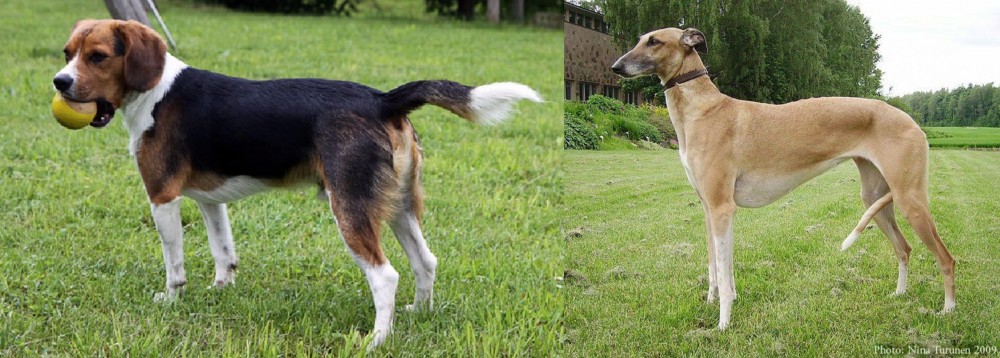 Beaglier is originated from Australia but Hortaya Borzaya is originated from Russia. Beaglier may grow 35 cm / 13 inches shorter than Hortaya Borzaya. Beaglier may weigh 25 kg / 55 pounds lesser than Hortaya Borzaya. Both Beaglier and Hortaya Borzaya has almost same life span. Both Beaglier and Hortaya Borzaya has almost same litter size. Beaglier requires High Maintenance. But Hortaya Borzaya requires Low Maintenance
Beaglier is originated from Australia but Hortaya Borzaya is originated from Russia. Beaglier may grow 35 cm / 13 inches shorter than Hortaya Borzaya. Beaglier may weigh 25 kg / 55 pounds lesser than Hortaya Borzaya. Both Beaglier and Hortaya Borzaya has almost same life span. Both Beaglier and Hortaya Borzaya has almost same litter size. Beaglier requires High Maintenance. But Hortaya Borzaya requires Low Maintenance
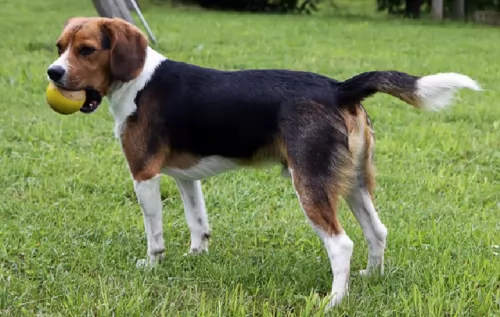 The Beaglier beginnings are set in Australia. Before around 30 years, breeders cross-breed the Beagle and the Cavalier King Charles Spaniel. The result actually turned out great – new we have a small sized breed with a wonderful, soft coat, very likeable looks, the calm and gentle dog which is very active despite his relaxed nature. They can be found around the globe nowadays and they are very popular because of their sweet nature.
The Beaglier beginnings are set in Australia. Before around 30 years, breeders cross-breed the Beagle and the Cavalier King Charles Spaniel. The result actually turned out great – new we have a small sized breed with a wonderful, soft coat, very likeable looks, the calm and gentle dog which is very active despite his relaxed nature. They can be found around the globe nowadays and they are very popular because of their sweet nature.
 The Hortaya Borzaya is an ancient sighthound from Asia with its origins in Kievan Rus = Grand Duchy of Lithuania = Polish-Lithuanian Commonwealth and the Empire of Russia. The Hortaya is a large dog, especially a long in body dog with a muscular build suitable for running fast. He is one of the most talented of sighthounds, able to track moving prey at quite great distances. He is an intensely active when running prey and quiet and well balanced when not working.
The Hortaya Borzaya is an ancient sighthound from Asia with its origins in Kievan Rus = Grand Duchy of Lithuania = Polish-Lithuanian Commonwealth and the Empire of Russia. The Hortaya is a large dog, especially a long in body dog with a muscular build suitable for running fast. He is one of the most talented of sighthounds, able to track moving prey at quite great distances. He is an intensely active when running prey and quiet and well balanced when not working.
In Asia and Russia, it is still a working hunting dog, hunting a variety of game such as Saiga antelopes, wolves, foxes, and hares. With tremendous endurance, the Hortaya can run at great speeds and great distances on the hunt. The Hortaya Borzaya is a long distance runner rather than a sprinter like the greyhound we are all so familiar with. He also needs very little rest between runs of up to 4 km. The Hortaya uses his sense of smell as well as sight in the hunt. They hunt solo, in pairs or in packs.
It was not until 2004 that the Hortaya was first exported to Europe and given full breeding papers. They went to Germany, Slovakia and the Czech Republic in 2004. They went to Switzerland and Finland in 2005 and to the United States around 2005. Prior to this the Hortaya Borzaya was bred only in its original territory for thousands of years.
Unlike Western breeding programs, the Hortaya is not bred for the purpose of improving the breed. Like Asian thoroughbred horses the breed is considered “finished”. Because of this there was no inbreeding, linebreeding or incest. This is true for about 4-6 generations of a line. This helps the breed to stay healthy.
The breed was developed centuries ago being bred by many different groups of people throughout the region, making it impossible to say exactly where and how this Central Asian/Afghanistan/ southern Russian breed developed. The Russian Kynological Federation (RKF) member of the FCI, developed a standard for the Hortaya Borzaya, which unlike most breed standards, does not tell you what the Hortaya must be like. Instead it tells you what he cannot be.
It gives boundaries that the dog must fit inside in order to be considered a Hortaya Borzaya. This is because the breeds of these dogs in their native territories want to preserve as many different types and sub-types as possible under the banner of one breed. To most people these dogs would look like very different breeds. For this reason, they have not been accepted into International Breed Groups and Associations. The breeders of these dogs do not want to be tied down to one standard. They do not want the breed to be separated into western lines and the original line or show lines and working lines. They wish to keep all the dogs within one grouping.
The breed is recognized on the national level by the originating countries and federations, including Russia’s. There are an estimated 2500-3500 dog of this breed in existence to day. Only a few dozen of the breed exist outside of the original countries. In other Eastern and European countries, the dogs may be registered with hunting associations instead of a breed association.
The breed is held mostly by hunters in remote, local areas and villages that are fairly isolated. Here the Hortaya is seen as a partner in feeding the hunters family and the dog is invaluable. In these remote areas a good hunting dog is equal in value to the good horse. Both are essential to the hunter and his family’s livelihood.
The Hortaya Borzaya is a pack dog and does well with the family as well as an athletic hunter. They hunt in packs, small groups or alone and bring their catch back to the hunter for the family meal. No hunter had to go with the dog. In fact, the hunters would send the dogs several times for food. The Hortaya might travel for miles across tough terrain to get food for the family.
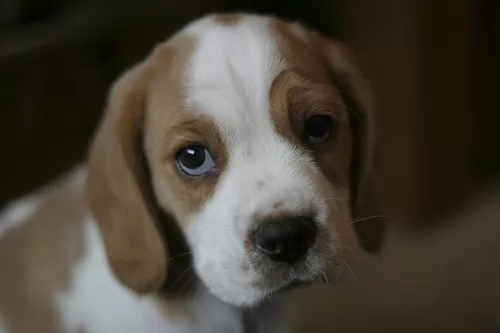 This small dog breed, called Beaglier and Beagler, has the look of his parents. Sometimes, they look more like the Spaniel, and sometimes they look more like the Beagle. This actually means that they are usually small, but can be, in some cases, even medium sized dog. They are usually tricoloured and in most cases, they have dark brown and cream hairs with white markings. They have longer ears, sometimes with more hairs if they look more like the Spaniel. They have large, dark brown eyes and usually dark nose. This breed is very loving and affectionate. They have a high need for a daily activity and they are the best choice for families with children.
This small dog breed, called Beaglier and Beagler, has the look of his parents. Sometimes, they look more like the Spaniel, and sometimes they look more like the Beagle. This actually means that they are usually small, but can be, in some cases, even medium sized dog. They are usually tricoloured and in most cases, they have dark brown and cream hairs with white markings. They have longer ears, sometimes with more hairs if they look more like the Spaniel. They have large, dark brown eyes and usually dark nose. This breed is very loving and affectionate. They have a high need for a daily activity and they are the best choice for families with children.
 This athletic sighthound is a handsome dog, ranging from large to giant. Remember there are many different ‘types’ of dogs within the one line/breed of Hortaya. Breed standards are exclusionary, and performance based rather than inclusionary, and appearance based. Still most of the breed lines share many of the same traits.
This athletic sighthound is a handsome dog, ranging from large to giant. Remember there are many different ‘types’ of dogs within the one line/breed of Hortaya. Breed standards are exclusionary, and performance based rather than inclusionary, and appearance based. Still most of the breed lines share many of the same traits.
They are a long legged breed with a very deep chest and flexible spine. They have immensely strong lungs and a narrow but long skull. Their gait is fluid, effortless trotting when not hunting. When she is hunting, they gallop like a horse and cover a lot of ground.
There eyes are usually black but can be any color and their fur is also any color. It is thick and dense. Finally, in the 2000’s, there were some dogs in a subline exported to Europe and to North America. Here, for this subgroup, a standard was established based on appearance and the color or the coat was now set at only white, blue, black, cream, red, sable and brindle, and piebald. They might or might not have a saddle. Definition of this type is still going on and has not been entirely settled yet. This standard is only for the European and American market show dogs.
These dogs, bred for show, have the same ability to run like the wind and for a very long time with his muscled body and long legs. The breed has strength and stamina that will fool you. He also has a long neck and broad back. He has thin, short ears.
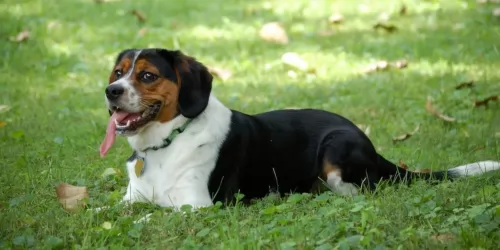 If you decide to bring a Beaglier to your family, it will be the best that you wait for your children to grow up a little bit. They are great to play buddy, but they get carried with the game and they can be very careless during the play. They fit perfectly with the children above the age of 5. They will run, jump, and do whatever your kid is about to do. They are friendly towards children they don’t know but they don’t do well with other animals they don’t know.
If you decide to bring a Beaglier to your family, it will be the best that you wait for your children to grow up a little bit. They are great to play buddy, but they get carried with the game and they can be very careless during the play. They fit perfectly with the children above the age of 5. They will run, jump, and do whatever your kid is about to do. They are friendly towards children they don’t know but they don’t do well with other animals they don’t know.
watchdog
One the main reasons why Beagliers are so much popular lay in their adaptability to any living conditions. They will fit in instantly in a family with children, but they will be happy as well if they live with just one person or even seniors. They can live indoors, houses and apartments without the yard. The Beaglier will enjoy the city parks, dog parks, beach, walking down the crowded streets. This breed is a not a quiet one – they will bark every time they notice something just to let you know. But, they are not aggressive type and they usually bark to communicate with people.
Usually, they are trained very easy. They have a stubborn nature, and if you learn how to get over with this temperament, you will be able to train and raise the sweetest dog ever. They should be trained and socialized while they are still puppies. Since they like too much, the best advice is to use treats to teach them everything that they will need to know. But, be careful with the feeding after the treats – Beagliers get easily obese if they are overfed.
 Children friendliness - yes, they are very good with children and will play with them for hours.
Children friendliness - yes, they are very good with children and will play with them for hours.
They have tremendous stamina, speed and intelligence to hunt on their own without the hunter and bring the prey back in good shape for the hunter’s family to eat.
No they are not very adaptable in terms of living arrangements. They will not do well in an apartment and probably not in the city as they need land to run.
Learning ability yes, they are intelligent and learn easily.
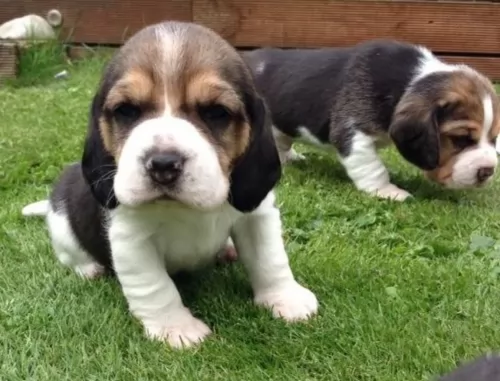 The Beaglier flap ears can be a very great place for the fungi, bacteria and dirt. You will have to clean their ears with an ear cleaning solution and a soft tissue once a week, especially if your pet is playing outside.
The Beaglier flap ears can be a very great place for the fungi, bacteria and dirt. You will have to clean their ears with an ear cleaning solution and a soft tissue once a week, especially if your pet is playing outside.
Cherry eye: Starts as redness in the corner of the eye. Happens when the third eyelid gland slips out of its place and show up as a red blob in the corner of the eye. Sometimes, the gland gets back to its original place in a couple of days, but it will be the best if you can take your dog to the vet as soon as you notice any readiness in his eyes.
Glaucoma: Happens because of the high eye pressure. This affects the normal outflow of the eye fluids and can cause blindness if not treated. It is the best to for your beagle to regular eye checks since this condition is not easy to diagnose in the begging.
 As previously mentioned, the original breed is isolated and therefore has a pretty good health track record. Most of the breed specific illnesses or conditions that usually are inherited barely exist in this breed.
As previously mentioned, the original breed is isolated and therefore has a pretty good health track record. Most of the breed specific illnesses or conditions that usually are inherited barely exist in this breed.
They have a propensity toward obesity and diet is essential to prevent other issues.
Chronic or acute pancreatitis is possible because the breed developed eating small meals and hardly any meat. Too much meat or fat could cause this.
No tolerance for high protein dog food. Can cause puppies to have life threatening damage to bones and cartilage that is irreversible.
Bloat – because of the deep chest and the intolerance for large meals they are prone to bloat.
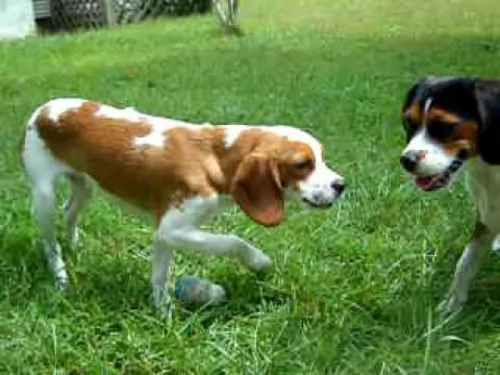 If you are not sure about the dog food you should give to your Beaglier considering the living environment and the lifestyle, it is always the best option to listen to the vet’s advice. They are prone to the obesity so you should keep a schedule that won’t be changed much. Feed them every day at the same time, no more than two meals per day once they get older than 6 months.
If you are not sure about the dog food you should give to your Beaglier considering the living environment and the lifestyle, it is always the best option to listen to the vet’s advice. They are prone to the obesity so you should keep a schedule that won’t be changed much. Feed them every day at the same time, no more than two meals per day once they get older than 6 months.
If you want your Beaglier to be happy, make sure you groom him daily. You will need about 5 minutes per day to brush him and keep him out of the tangles. Bathe then once in a month, that will be enough. Clip their nails regularly. Keep their ears cleaned.
They need a daily activity or they will get destructive. Be careful with the feeding since they get obese very quickly.
Since they are natural hunters, they will like to play chase. You can take them to the woods for a walk or for a run but make sure you train them to respond to your commands before you take them off the leash. They are very curious and they will easily wander off. They can be taught to play inside the house as well. They love to explore new areas so it will be great if you can take them with you for a holiday.
 As mentioned above do not overfeed a Hortaya Borzaya puppy. There is serious risk of irreversible damage if you do. Feed small meals 3-6 times a day with lower protein.
As mentioned above do not overfeed a Hortaya Borzaya puppy. There is serious risk of irreversible damage if you do. Feed small meals 3-6 times a day with lower protein.
3 cups of an average protein high quality dog food served at least 3-4 times per day. To avoid bloat do not feed large meals before or after exercise and don’t let your dog drink a lot of water at one time.
This is an extremely active dog bred to hunt 5-6 times a day over wide expanses of various and rough terrain. They need exercise. If you run, they will run with you happily and they will outlast you. They are good at and enjoy fetch, chase, agility, and field trials. They will last hours at any game they play.